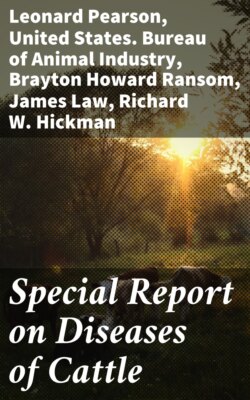Читать книгу Special Report on Diseases of Cattle - Lowe - Страница 29
На сайте Литреса книга снята с продажи.
CHRONIC TYMPANITES.
ОглавлениеCattle, especially those that have been kept in the stable all winter, are liable to suffer from chronic tympanites. In this form they bloat up after feeding, but seldom swell so much as to cause any alarm. The chronic form of indigestion may also follow an acute attack like that previously described. This is also a symptom of tuberculosis when the lymphatic glands lying between the lungs are so enlarged as to press upon and partly occlude the esophagus. It may develop in calves as a result of the formation of hair balls in the stomach.
Treatment.—Treatment should be preceded by a moderate dose of purgative medicine: 1 pound of sulphate of magnesia (Epsom salt) or sulphate of soda (Glauber's salt), half an ounce of powdered Barbados aloes, 1 ounce of powdered ginger, 1 pint of molasses. The salts and aloes should be dissolved by stirring for a few minutes in 2 quarts of lukewarm water, then the molasses should be added, and after all the ingredients have been stirred together for about 10 minutes the dose should be administered. After the operation of the purgative it is generally necessary to give some tonic and antacid preparation to promote digestion, which is imperfectly performed in such cases. The following may be used: Powdered gentian, 3 ounces; powdered bicarbonate of potash, 3 ounces; powdered ginger, 3 ounces; powdered capsicum, 1 ounce. Mix and divide into 12 powders, one of which should be given three times a day before feeding, shaken up with a pint and a half of water. It is also advantageous in such cases to give two heaped teaspoonsfuls of wood charcoal, mixed with the animal's feed three times a day. The animal should also go out during the day, as want of exercise favors the continuance of this form of indigestion. If the dung is hard, the constipation should be overcome by feeding a little flaxseed twice daily or by giving a handful of Glauber's salt in the feed once or twice daily, as may be necessary. Roots, silage, and other succulent feeds are useful in this connection. If tuberculosis is suspected as the cause of chronic bloating, a skilled veterinarian should make a diagnosis, using the tuberculin test if necessary. Until it is settled that the cow has not tuberculosis, she should be kept apart from the other members of the herd.
